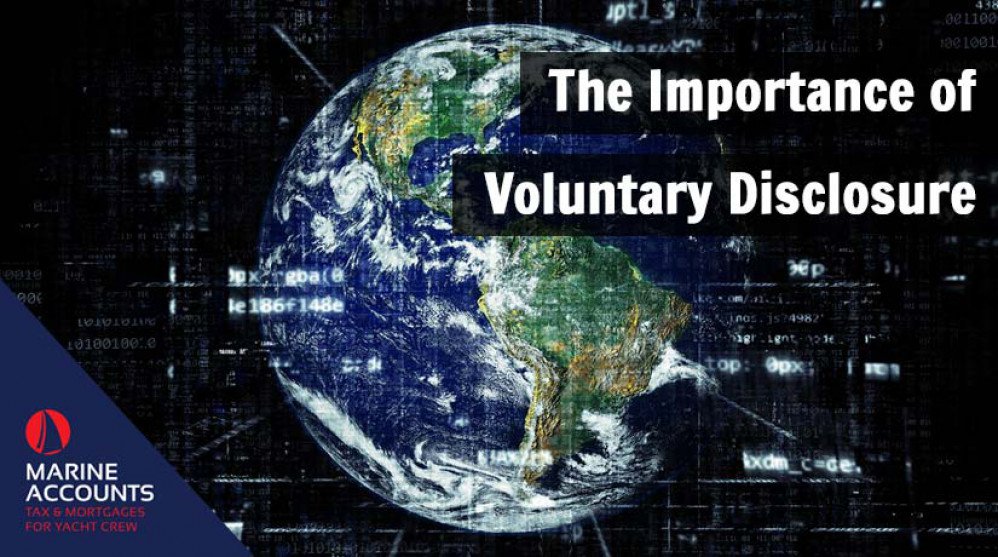The Importance of Voluntary Disclosure
- Authors
-
-

- Name
- Patrick Maflin
-

Image source: https://pixabay.com/de/photos/erde-internet-globalisierung-2254769/
Having identified a growing trend amongst seafarers who dangerously disregard the requirement to declare their income and holdings to HMRC, we felt it necessary to address the issue.
It is important to understand the penalties involved in possessing offshore non-tax compliant holdings and the risk that this poses for you.
In this article, we explore the current reporting legislation, potential penalties and what you should do to avoid falling afoul of the law.
Read on to learn more or click a jump menu listed below to skip to a desired chapter.
Chapters
Background
Since September 2017, HMRC have been receiving batches of information including details of financial accounts held both on and offshore by UK residents.
These details include holdings in areas of previous anonymity such as the British Virgin Islands, Cayman Islands, Luxembourg, Liechtenstein and Mauritius.
As a result, any undeclared income from employment, investments or rental properties, particularly those income sources which are UK based, are now highly likely to be exposed in the near future.
The legislation now in place dictates that hiding or attempting to hide your holdings, and avoid your obligations when it comes to declaring your income to the tax authorities, is no longer an option.
The Legislation
Introduced in 2014 and implemented for the first time by HMRC in 2017, the Automatic Exchange of Information (AEOI) and Common Reporting Standard (CRS) have been successful tools in enabling tax authorities around the world to discover previously undetectable sources of income.
This works to ensure that financial institutions are transparent in declaring the assets held by their clientele to all tax authorities, not just in the UK.
The Automatic Exchange of Information and Common Reporting Standard apply to any person with financial holdings or responsibilities that lie outside of the country where they are a tax resident, including income from overseas rental properties.
However, in the event of an audit, HMRC also have the right to request details of your onshore holdings and any shore based income.
As a result, HMRC are using this information to determine cases where income remains undeclared despite your obligation to notify them, whether there is tax to be paid or not.
In addition to this, further anti-avoidance legislation known as Requirement to Correct (RTC) provides HMRC with the legal authority to charge penalties to any UK resident who has any relevant non-tax compliant holdings.
It is vital to remember that if you under-declare your income, the penalties are almost as severe as not disclosing your holdings at all.
Penalities
Deliberate failures to settle historical tax irregularities carry a penalty of up to 200% of any outstanding liabilities.
This can be reduced if the failure was caused by carelessness, although it is important to remember that each case will be reviewed on an individual basis and outcomes can be unpredictable.
Each case that HMRC investigates will carry a different penalty, with the most serious cases open to the possibility of a criminal investigation.
What To Do Next
The only sensible course of action in this new climate, is to ensure that you are tax-compliant by voluntarily disclosing your income to HMRC.
The longer you leave it, the larger the penalties will be.
If you remain one of the many who are yet to declare your income from yachting, or more importantly from UK sources, it is best to seek help from a tax advisor who can help you achieve a position of tax transparency.
By voluntarily disclosing your income, you can ensure that you become tax compliant before HMRC start asking questions.
If you have any questions or would like advice on how you can become tax compliant, get in touch with us today.
Speak to Us or Comment!
If you have concerns about undeclared yachting income and what you need to do to avoid any scrutiny from the tax authorities, we'd like to hear from you. Get in touch with us today or let us know your thoughts in the comments section below.
Liked this article? Try reading:
Certificate of Tax Position - How to Complete It
Any advice in this publication is not intended or written by Marine Accounts to be used by a client or entity for the purpose of (i) avoiding penalties that may be imposed on any taxpayer or (ii) promoting, marketing or recommending to another party matters herein.


